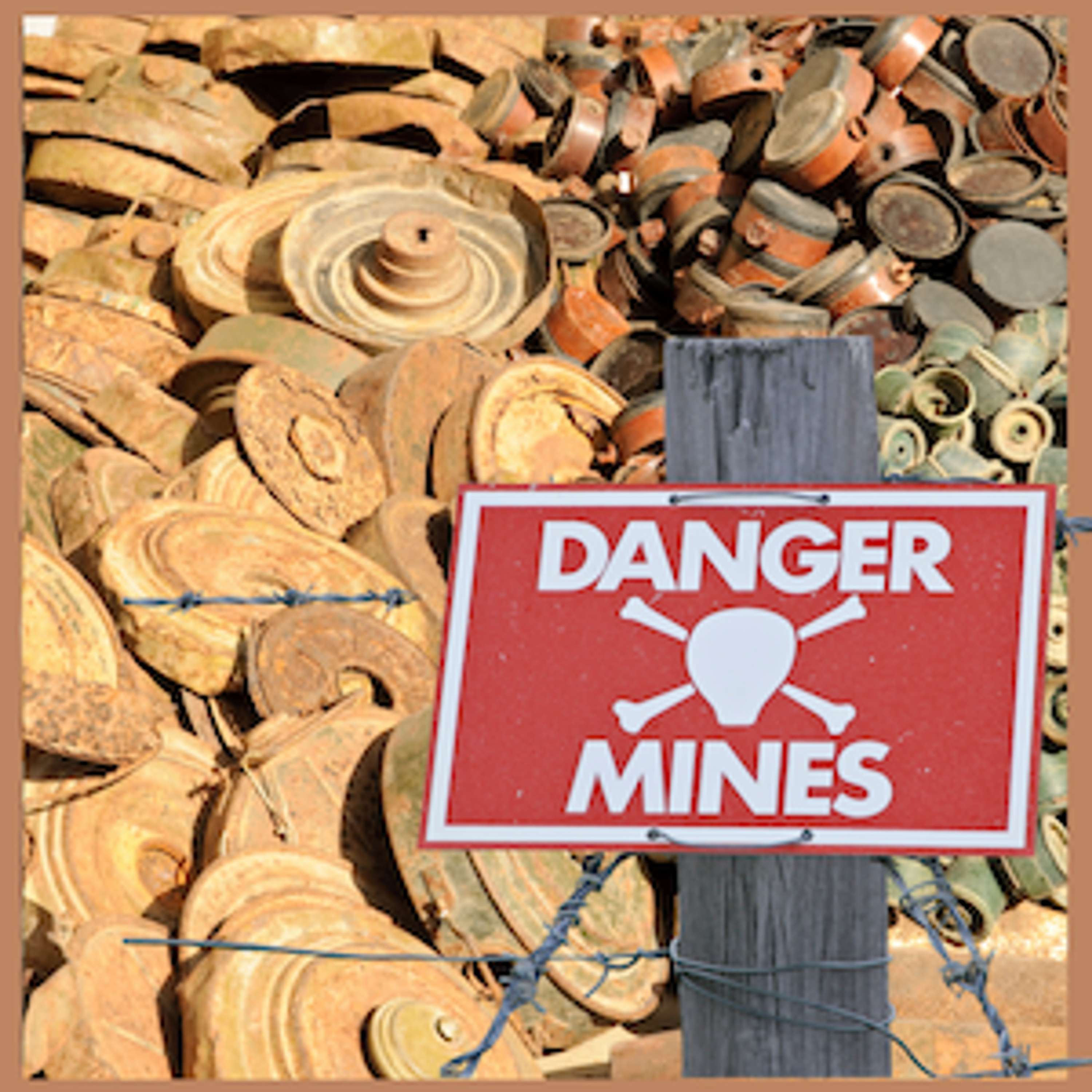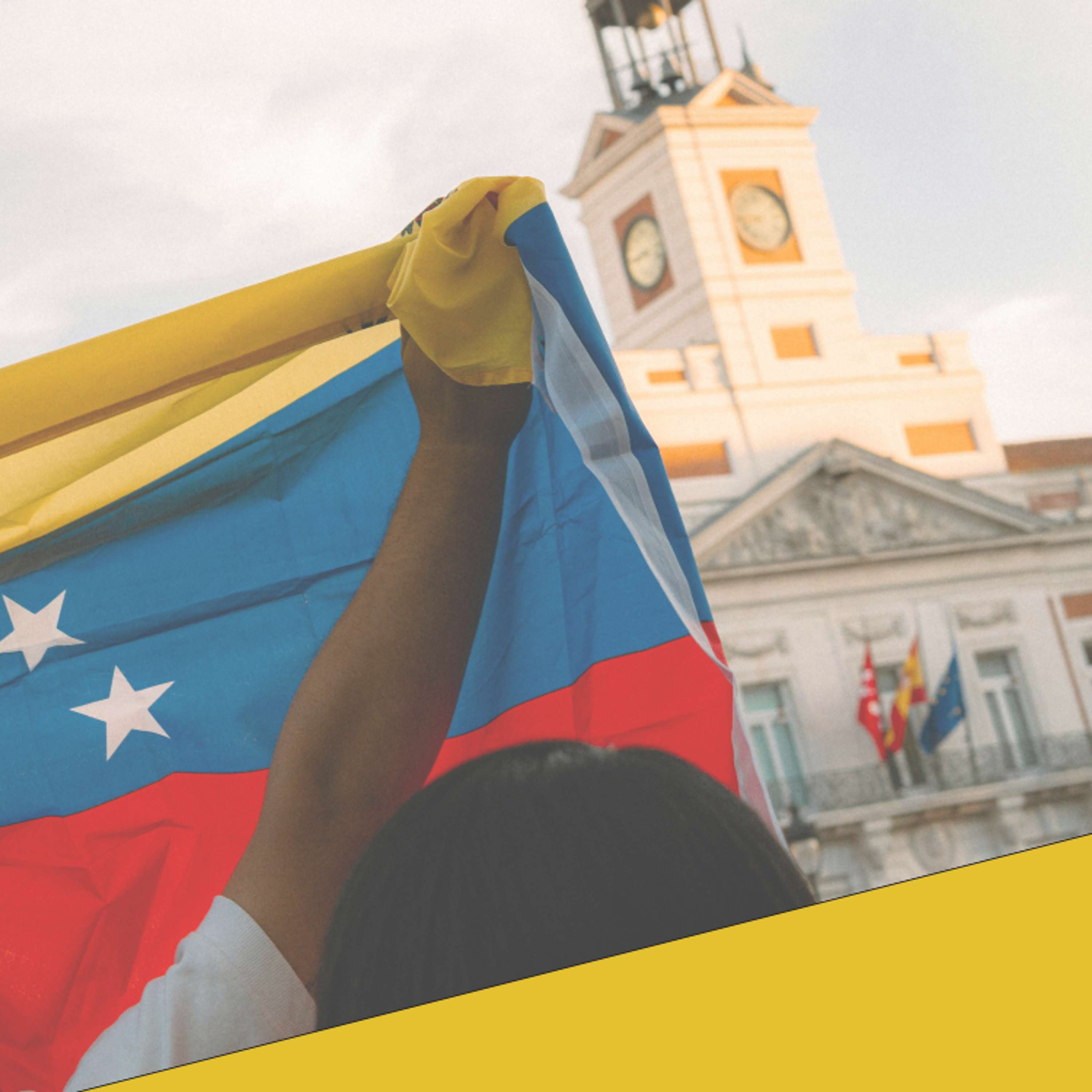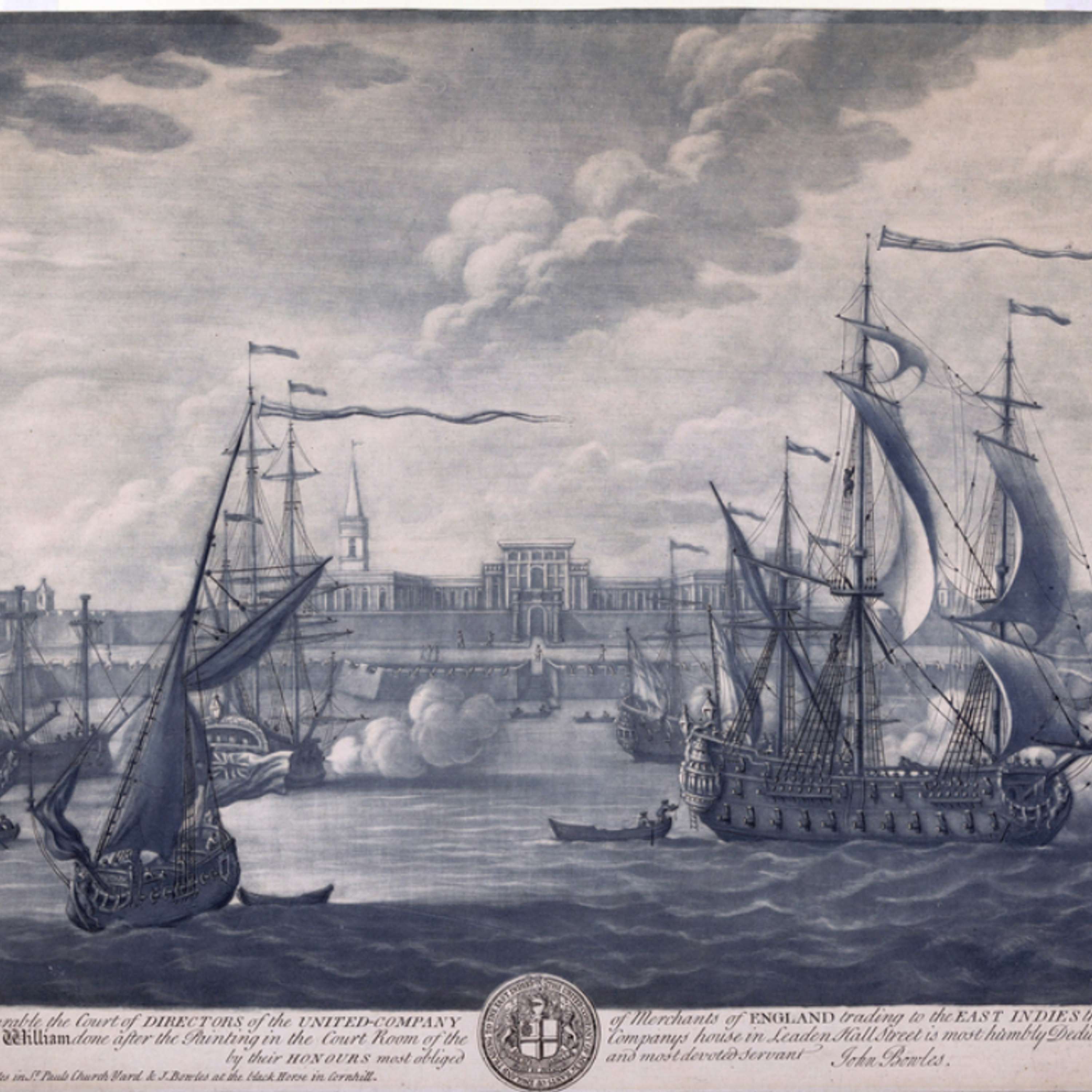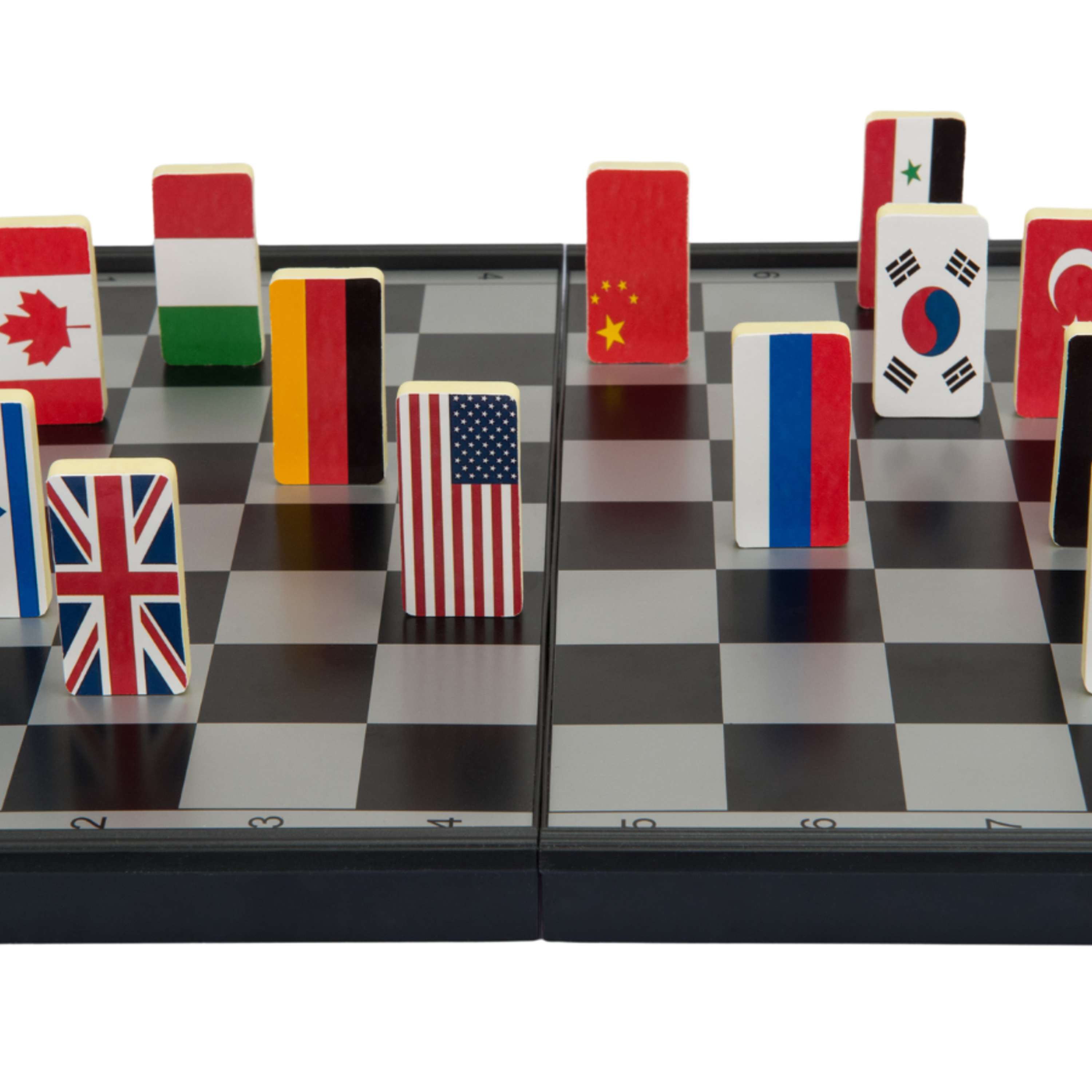Shows
 New FrontiersNukes, Landmines and Disarmament: A Conversation with Matthew Breay Bolton - PART IHow could activists, academics, NGOs and others lead the world to a Nuclear Weapons Ban treaty in 2017, despite resistance from the world’s major nuclear powers? Why do states, militaries, and militias still use landmines in war zones, despite their proven inability to deter an opposing military—or even delay its assault for an extended time? How effective have global efforts to clear landmines from post-conflict societies been? What role has the United States played in helping to create—and address—the problems posed by landmines and unexploded ordinance? And could the Trump administration’s decision to suspect aid for global...2025-05-1435 min
New FrontiersNukes, Landmines and Disarmament: A Conversation with Matthew Breay Bolton - PART IHow could activists, academics, NGOs and others lead the world to a Nuclear Weapons Ban treaty in 2017, despite resistance from the world’s major nuclear powers? Why do states, militaries, and militias still use landmines in war zones, despite their proven inability to deter an opposing military—or even delay its assault for an extended time? How effective have global efforts to clear landmines from post-conflict societies been? What role has the United States played in helping to create—and address—the problems posed by landmines and unexploded ordinance? And could the Trump administration’s decision to suspect aid for global...2025-05-1435 min New FrontiersIsrael in Crisis- Part TwoDid Israeli Prime Minister Benjamin Netanyahu’s drive to reform Israel’s judiciary—which sparked intense, broad based opposition from Israeli society and sharply curtailed institutional checks on executive power—play a role in the timing of Hamas’s October 7, 2023, attacks on Israel? Could the internal conflict between Israelis who support and oppose Netanyahu’s reform agenda pose an even greater threat to Israel than the external conflict between it and external adversaries? How has the war between Israel and Hamas affected Israeli and Palestinian societies? And what are the prospects for humanitarian relief in Gaza, Palestinian self-governance, and a durable pe...2025-03-1929 min
New FrontiersIsrael in Crisis- Part TwoDid Israeli Prime Minister Benjamin Netanyahu’s drive to reform Israel’s judiciary—which sparked intense, broad based opposition from Israeli society and sharply curtailed institutional checks on executive power—play a role in the timing of Hamas’s October 7, 2023, attacks on Israel? Could the internal conflict between Israelis who support and oppose Netanyahu’s reform agenda pose an even greater threat to Israel than the external conflict between it and external adversaries? How has the war between Israel and Hamas affected Israeli and Palestinian societies? And what are the prospects for humanitarian relief in Gaza, Palestinian self-governance, and a durable pe...2025-03-1929 min New FrontiersThe Path to Autocracy: Venezuela and BeyondIn this episode of New Frontiers, Mark Williams sits down with political scientist Javier Corrales, to discuss his latest book—‘Autocracy Rising: How Venezuela Transitioned to Authoritarianism’. Known for decades as one of the developing world’s most stable democracies, Venezuela’s slide toward autocracy began with Hugo Chávez’s rise to the presidency. In 1998 public displeasure with various economic, political, and social issues swept Chávez to power. Thereafter, power itself increasingly accrued to the presidency—at the expense of civil society elements, pluralism, and institutional checks and balances—to the point that Freedom House now ranks the Venezuelan pol...2024-12-1335 min
New FrontiersThe Path to Autocracy: Venezuela and BeyondIn this episode of New Frontiers, Mark Williams sits down with political scientist Javier Corrales, to discuss his latest book—‘Autocracy Rising: How Venezuela Transitioned to Authoritarianism’. Known for decades as one of the developing world’s most stable democracies, Venezuela’s slide toward autocracy began with Hugo Chávez’s rise to the presidency. In 1998 public displeasure with various economic, political, and social issues swept Chávez to power. Thereafter, power itself increasingly accrued to the presidency—at the expense of civil society elements, pluralism, and institutional checks and balances—to the point that Freedom House now ranks the Venezuelan pol...2024-12-1335 min New FrontiersThe East India Company: Commerce, Conquest, and ColonialismEstablished in 1600 to secure trade relations between India, East and Southeast Asia, and Britain, the East India Company did this and much, much more. For nearly 300 years it ran a global trading network that operated for profit, politics, and eventually empire. In the process it not only became the world’s first multinational corporation, but — thanks to its own army, navy, currency, and legal system—came to rule territories far more extensive than its home base of the British Isles. On this episode, Mark Williams speaks with historian Ian Barrow about this remarkable company, how it came to support Britis...2024-11-0139 min
New FrontiersThe East India Company: Commerce, Conquest, and ColonialismEstablished in 1600 to secure trade relations between India, East and Southeast Asia, and Britain, the East India Company did this and much, much more. For nearly 300 years it ran a global trading network that operated for profit, politics, and eventually empire. In the process it not only became the world’s first multinational corporation, but — thanks to its own army, navy, currency, and legal system—came to rule territories far more extensive than its home base of the British Isles. On this episode, Mark Williams speaks with historian Ian Barrow about this remarkable company, how it came to support Britis...2024-11-0139 min New FrontiersElection 2024 and US Foreign PolicyHow has US foreign policy changed since the end of the Cold War? When—and over what issues—did America’s largely bipartisan foreign policy collapse? What major foreign policy challenges await the next US president? Where will the next US administration take America, and how might it seek to advance and protect its notion of the national interest? In this episode of New Frontiers, Ambassador Michael McKinley joins Mark Williams to discuss the foreign policy implications of the 2024 US presidential election. Their conversation ranges from such historic milestones as the end of the Cold War and the Global War on...2024-09-1734 min
New FrontiersElection 2024 and US Foreign PolicyHow has US foreign policy changed since the end of the Cold War? When—and over what issues—did America’s largely bipartisan foreign policy collapse? What major foreign policy challenges await the next US president? Where will the next US administration take America, and how might it seek to advance and protect its notion of the national interest? In this episode of New Frontiers, Ambassador Michael McKinley joins Mark Williams to discuss the foreign policy implications of the 2024 US presidential election. Their conversation ranges from such historic milestones as the end of the Cold War and the Global War on...2024-09-1734 min New FrontiersU.S. Militias: Guarding Tradition or Courting ChaosAmerica’s modern militia movement emerged in the 1990s, following armed stand-offs with government authorities at Ruby Ridge, Idaho and Waco, Texas. After rising to 370 groups nationwide by 1996, the number of these militias diminished to 68 by 1999—only to surge again when Barak Obama was elected president in 2008. After Donald Trump lost the 2020 presidential election, several militia groups figured prominently in the January 6 Insurrection which sought to prevent the peaceful transfer of power to Joe Biden. What drives US citizens to form militia groups? What role does racism, anti-government sentiments, nostalgia, and economic, social, and political changes play in their emer...2024-05-2928 min
New FrontiersU.S. Militias: Guarding Tradition or Courting ChaosAmerica’s modern militia movement emerged in the 1990s, following armed stand-offs with government authorities at Ruby Ridge, Idaho and Waco, Texas. After rising to 370 groups nationwide by 1996, the number of these militias diminished to 68 by 1999—only to surge again when Barak Obama was elected president in 2008. After Donald Trump lost the 2020 presidential election, several militia groups figured prominently in the January 6 Insurrection which sought to prevent the peaceful transfer of power to Joe Biden. What drives US citizens to form militia groups? What role does racism, anti-government sentiments, nostalgia, and economic, social, and political changes play in their emer...2024-05-2928 min New FrontiersIndia Today: One Question, Three Perspectives“What’s the one thing about India, that isn’t getting enough attention?” That’s the question we put to three India experts; and not surprisingly, we got three different responses. In August 2023, India celebrated its first successful moon landing. However, while this achievement made headlines around the world, other developments of equal or greater significance may be going unnoticed. One is India’s drift toward illiberal democracy—or perhaps even autocracy. Could this impede its budding strategic relationship with the United States? Another is the Modi government’s apparent efforts to erase important aspects of India’s m...2024-03-1843 min
New FrontiersIndia Today: One Question, Three Perspectives“What’s the one thing about India, that isn’t getting enough attention?” That’s the question we put to three India experts; and not surprisingly, we got three different responses. In August 2023, India celebrated its first successful moon landing. However, while this achievement made headlines around the world, other developments of equal or greater significance may be going unnoticed. One is India’s drift toward illiberal democracy—or perhaps even autocracy. Could this impede its budding strategic relationship with the United States? Another is the Modi government’s apparent efforts to erase important aspects of India’s m...2024-03-1843 min New FrontiersRace, Empire, and Policing in ParisIn June 2023, French police killed 17-year-old Nahal Merzouk during a traffic stop outside of Paris. The killing led to days of street protests, widespread condemnation of racialized police practices, and over 1,300 arrests. This was particularly significant in a country like France, where discussions about race are often avoided or rejected. To gain a deeper understanding of French police practices, Mark Williams sits down with historian Amit Prakash, whose new book—Empire on the Seine—explores how France’s colonial history helped shape how French law enforcement policed North Africans living in Paris from 1925 to 1975. Prakash also details how discrimination and ra...2024-01-0836 min
New FrontiersRace, Empire, and Policing in ParisIn June 2023, French police killed 17-year-old Nahal Merzouk during a traffic stop outside of Paris. The killing led to days of street protests, widespread condemnation of racialized police practices, and over 1,300 arrests. This was particularly significant in a country like France, where discussions about race are often avoided or rejected. To gain a deeper understanding of French police practices, Mark Williams sits down with historian Amit Prakash, whose new book—Empire on the Seine—explores how France’s colonial history helped shape how French law enforcement policed North Africans living in Paris from 1925 to 1975. Prakash also details how discrimination and ra...2024-01-0836 min New FrontiersAfter the Insurrection: Assessing American DemocracyOn January 6, 2021, supporters of US President Donald Trump—spurred on and energized by the defeated president himself—launched a violent attack on the US capital to stop the peaceful transfer of power to president-elect Joe Biden. What are we to make of the January 6 insurrection? What does it tell us about ourselves as Americans and the state of our democracy? And with another presidential election approaching—and an indicted Donald Trump the likely Republican candidate—how might our parties, courts, and Justice Department act in ways that could safeguard democracy, or threaten it even more? In this episo...2023-10-3036 min
New FrontiersAfter the Insurrection: Assessing American DemocracyOn January 6, 2021, supporters of US President Donald Trump—spurred on and energized by the defeated president himself—launched a violent attack on the US capital to stop the peaceful transfer of power to president-elect Joe Biden. What are we to make of the January 6 insurrection? What does it tell us about ourselves as Americans and the state of our democracy? And with another presidential election approaching—and an indicted Donald Trump the likely Republican candidate—how might our parties, courts, and Justice Department act in ways that could safeguard democracy, or threaten it even more? In this episo...2023-10-3036 min New FrontiersINTL' NGOs: What You Need to KnowInternational nongovernmental organizations (INGO’s) like Amnesty International, Care, Oxfam, or World Vision operate independently of governments around the world. But what do we really know about these organizations and their operations, behavior, effectiveness or limitations? What might they be doing or be unable to do, in a country like Ukraine, where many people are suffering and there are dire needs, and yet the war that Russia unleashed impedes their work? In this episode, political scientist and INGO specialist Sarah Stroup lifts the curtain on international nongovernmental organizations to illuminate their function, efficacy, and constraints. ...2023-09-1233 min
New FrontiersINTL' NGOs: What You Need to KnowInternational nongovernmental organizations (INGO’s) like Amnesty International, Care, Oxfam, or World Vision operate independently of governments around the world. But what do we really know about these organizations and their operations, behavior, effectiveness or limitations? What might they be doing or be unable to do, in a country like Ukraine, where many people are suffering and there are dire needs, and yet the war that Russia unleashed impedes their work? In this episode, political scientist and INGO specialist Sarah Stroup lifts the curtain on international nongovernmental organizations to illuminate their function, efficacy, and constraints. ...2023-09-1233 min New FrontiersIsrael in CrisisFor months, hundreds of thousands of Israeli citizens have taken to the streets to protest government plans to overhaul the judiciary—including plans that would vitiate checks on executive power, allow a simple majority of 61 in the 120-seat Knesset to override almost any ruling by Israel’s Supreme Court, and permit politicians to appoint most of the Court’s justices. Both the protests and proposed reforms take place against the backdrop of significant demographic changes which, in turn, have enhanced the power and parliamentary representation of Israel’s religious parties. Given the Knesset’s current makeup therefore, the reforms will—at le...2023-06-2138 min
New FrontiersIsrael in CrisisFor months, hundreds of thousands of Israeli citizens have taken to the streets to protest government plans to overhaul the judiciary—including plans that would vitiate checks on executive power, allow a simple majority of 61 in the 120-seat Knesset to override almost any ruling by Israel’s Supreme Court, and permit politicians to appoint most of the Court’s justices. Both the protests and proposed reforms take place against the backdrop of significant demographic changes which, in turn, have enhanced the power and parliamentary representation of Israel’s religious parties. Given the Knesset’s current makeup therefore, the reforms will—at le...2023-06-2138 min New FrontiersWhy We Need Environmental Justice Part 2 of 2Part 2 of 2What is meant by such terms as environmental injustice or environmental racism? What is the environmental justice movement and how is it manifest—in the United States and beyond? In this episode of New Frontiers, political scientist Kemi Fuentes-George discusses these topics and what achieving environmental justice for marginalized populations might actually entail.SHOW NOTESFor more information on this and other podcasts go to the Rohatyn Center for Global Affairs at Middlebury College website https://www.middlebury.edu/office/rohatyn Between Preservation and Exploitation by Kemi Fuentes-George (MIT...2023-03-2326 min
New FrontiersWhy We Need Environmental Justice Part 2 of 2Part 2 of 2What is meant by such terms as environmental injustice or environmental racism? What is the environmental justice movement and how is it manifest—in the United States and beyond? In this episode of New Frontiers, political scientist Kemi Fuentes-George discusses these topics and what achieving environmental justice for marginalized populations might actually entail.SHOW NOTESFor more information on this and other podcasts go to the Rohatyn Center for Global Affairs at Middlebury College website https://www.middlebury.edu/office/rohatyn Between Preservation and Exploitation by Kemi Fuentes-George (MIT...2023-03-2326 min New FrontiersWhy We Need Environmental Justice Part 1 of 2Part 1 of 2What is meant by such terms as environmental injustice or environmental racism? What is the environmental justice movement and how is it manifest—in the United States and beyond? In this episode of New Frontiers, political scientist Kemi Fuentes-George discusses these topics and what achieving environmental justice for marginalized populations might actually entail.SHOW NOTESFor more information on this and other podcasts go to the Rohatyn Center for Global Affairs at Middlebury College website https://www.middlebury.edu/office/rohatyn Between Preservation and Exploitation by Kemi Fuentes-George (MIT...2023-03-2328 min
New FrontiersWhy We Need Environmental Justice Part 1 of 2Part 1 of 2What is meant by such terms as environmental injustice or environmental racism? What is the environmental justice movement and how is it manifest—in the United States and beyond? In this episode of New Frontiers, political scientist Kemi Fuentes-George discusses these topics and what achieving environmental justice for marginalized populations might actually entail.SHOW NOTESFor more information on this and other podcasts go to the Rohatyn Center for Global Affairs at Middlebury College website https://www.middlebury.edu/office/rohatyn Between Preservation and Exploitation by Kemi Fuentes-George (MIT...2023-03-2328 min New FrontiersWhatever Happened To "Essential" WorkersHow did the COVID pandemic affect America’s workers—especially those deemed “essential” who often were poorly paid, nonunionized, lacked meaningful benefits, and were required to continue working while most other workers stayed home? How did these workers respond to the health risks they encountered on the job, and how did their struggle for labor justice transform—at least for a while—political discourse and consciousness in America? Jamie McCallum and Mark Williams explore these and other issues in this episode of New Frontiers. SHOW NOTES: For more information on this and other podcasts go to...2023-02-1541 min
New FrontiersWhatever Happened To "Essential" WorkersHow did the COVID pandemic affect America’s workers—especially those deemed “essential” who often were poorly paid, nonunionized, lacked meaningful benefits, and were required to continue working while most other workers stayed home? How did these workers respond to the health risks they encountered on the job, and how did their struggle for labor justice transform—at least for a while—political discourse and consciousness in America? Jamie McCallum and Mark Williams explore these and other issues in this episode of New Frontiers. SHOW NOTES: For more information on this and other podcasts go to...2023-02-1541 min New FrontiersWhy Did Turkish Democracy CollapseAfter six decades of multiparty politics, Turkish democracy has collapsed. Yes, the trappings of democracy are still visible. Elections are held, parliament sits in session, the courts rule, and the elected executive leads. Yet, the substance of democracy moves ever further into the past. How did this happen? Why? And what implications does the unraveling of democracy in Turkey hold for political systems in other countries? In this episode, Mark Williams explores these topics with political scientist Sebnem Gumuscu, whose recent scholarship highlights the reality of democratic backsliding. Sebnem Gumuscu is an associate professor of political sci...2022-11-0232 min
New FrontiersWhy Did Turkish Democracy CollapseAfter six decades of multiparty politics, Turkish democracy has collapsed. Yes, the trappings of democracy are still visible. Elections are held, parliament sits in session, the courts rule, and the elected executive leads. Yet, the substance of democracy moves ever further into the past. How did this happen? Why? And what implications does the unraveling of democracy in Turkey hold for political systems in other countries? In this episode, Mark Williams explores these topics with political scientist Sebnem Gumuscu, whose recent scholarship highlights the reality of democratic backsliding. Sebnem Gumuscu is an associate professor of political sci...2022-11-0232 min New FrontiersWhat to do about Cosmic Garbage.According to the US Space Force, only 2,000 of the 22,000 objects that have been tracked circling the Earth are fully operational, functioning satellites. Put differently, roughly 90 percent of the objects that can be tracked circling the globe is junk—space junk, or cosmic garbage. How did it get there, why does it keep accumulating, and how best might we address this global problem are all topics that Akhil Rao, Assistant Professor of Economics at Middlebury College, writes about in a co-authored article published in the Proceedings of the National Academy of Sciences. In this episode of New Frontiers, Professor Rao sp...2022-05-0244 min
New FrontiersWhat to do about Cosmic Garbage.According to the US Space Force, only 2,000 of the 22,000 objects that have been tracked circling the Earth are fully operational, functioning satellites. Put differently, roughly 90 percent of the objects that can be tracked circling the globe is junk—space junk, or cosmic garbage. How did it get there, why does it keep accumulating, and how best might we address this global problem are all topics that Akhil Rao, Assistant Professor of Economics at Middlebury College, writes about in a co-authored article published in the Proceedings of the National Academy of Sciences. In this episode of New Frontiers, Professor Rao sp...2022-05-0244 min New FrontiersWhat Made Russians Skeptics About Democratic Capitalism?In this episode, Mark Williams talks with Will Pyle, the Frederick C. Dirks Professor of International Economics at Middlebury College, about recent findings he published in the journal Post-Soviet Affairs. Their discussion explores why Russians of a certain cohort—although liberated from the economic and political constraints of Soviet Communism—are not the strong enthusiasts of democracy and capitalism which many westerners believed they would become after the USSR collapsed. Show Notes:Presented by the Rohatyn Center for Global Affairs at Middlebury College.Music CreditsForte by Ketsa - Summer with Sound AlbumSoul Zone b...2022-03-1343 min
New FrontiersWhat Made Russians Skeptics About Democratic Capitalism?In this episode, Mark Williams talks with Will Pyle, the Frederick C. Dirks Professor of International Economics at Middlebury College, about recent findings he published in the journal Post-Soviet Affairs. Their discussion explores why Russians of a certain cohort—although liberated from the economic and political constraints of Soviet Communism—are not the strong enthusiasts of democracy and capitalism which many westerners believed they would become after the USSR collapsed. Show Notes:Presented by the Rohatyn Center for Global Affairs at Middlebury College.Music CreditsForte by Ketsa - Summer with Sound AlbumSoul Zone b...2022-03-1343 min New FrontiersChina and the American Right“Asia First was an insistence that Pacific affairs receive as much, if not more attention than European Atlantic relations in the cold war. Its proponents, its supporters, many of whom were very powerful, conservative voices in the Senate and in Congress felt like U.S. foreign policy after World War II was neglecting mainland Asia and therefore imperiling the whole cold war.” — Joyce MaoIn this episode (2), Mark Williams, director of the Rohatyn Center, talks with Joyce Mao, Middlebury College associate professor of history, about the Asia First initiative and, in particular, the effects that US-China-Taiwan relations had on...2022-02-1440 min
New FrontiersChina and the American Right“Asia First was an insistence that Pacific affairs receive as much, if not more attention than European Atlantic relations in the cold war. Its proponents, its supporters, many of whom were very powerful, conservative voices in the Senate and in Congress felt like U.S. foreign policy after World War II was neglecting mainland Asia and therefore imperiling the whole cold war.” — Joyce MaoIn this episode (2), Mark Williams, director of the Rohatyn Center, talks with Joyce Mao, Middlebury College associate professor of history, about the Asia First initiative and, in particular, the effects that US-China-Taiwan relations had on...2022-02-1440 min New FrontiersShould Corporations Govern Global Food Systems?In this episode, Molly Anderson, William R. Kenan Jr. Professor of Food Studies at Middlebury College, joins Mark Williams, director of the Rohatyn Center for Global Affairs, to discuss her recent article titled “UN Food Systems Summit 2021: Dismantling Democracy and Resetting Corporate Control of Food Systems”. At issue is whether multinational corporations (MNC's) should have more influence and say in controlling/governing food systems than does civil society and its constituent parts most plagued by problems of food insecurity. Anderson believes MNC's should not enjoy such a privileged position over so vital a basic necessity, and offers a forceful crit...2022-02-1036 min
New FrontiersShould Corporations Govern Global Food Systems?In this episode, Molly Anderson, William R. Kenan Jr. Professor of Food Studies at Middlebury College, joins Mark Williams, director of the Rohatyn Center for Global Affairs, to discuss her recent article titled “UN Food Systems Summit 2021: Dismantling Democracy and Resetting Corporate Control of Food Systems”. At issue is whether multinational corporations (MNC's) should have more influence and say in controlling/governing food systems than does civil society and its constituent parts most plagued by problems of food insecurity. Anderson believes MNC's should not enjoy such a privileged position over so vital a basic necessity, and offers a forceful crit...2022-02-1036 min